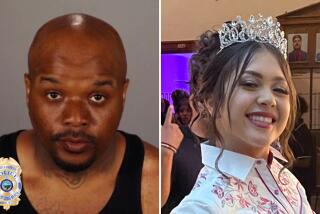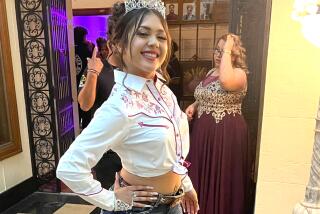Soto Feared for Her Life, Abuse Expert Says at Trial
- Share via
Murder defendant Gladis Soto was a battered wife who feared for her life and the safety of her children when she turned a gun on her abusive husband and fatally shot him, a clinical psychologist testified Monday.
“She reported that she felt he would or could kill her,” said Nancy Kaser-Boyd, a UCLA psychologist and an expert in the study of battered women.
Called as the final witness for the defense, Kaser-Boyd told jurors that Soto, 38, was suffering from depression, post-traumatic stress disorder and severe anxiety at the time she killed her spouse, 35-year-old Pedro Alba.
Soto, who is facing a life prison sentence if convicted of murder, told police she fatally shot Alba once in the head as he was sleeping Feb. 20 in the bedroom of their Ventura apartment.
Hours later she cut off Alba’s head, arms and legs with an electric saw, stuffed the remains in trash bags and attempted to burn them in the Ventura River bottom, according to authorities.
Seeking to explain the grisly slaying as the desperate act of a badly abused woman, defense attorneys asked Kaser-Boyd to evaluate Soto.
During three separate sessions, Kaser-Boyd interviewed Soto and ran the defendant through a battery of psychological tests.
Her conclusion, she told jurors in Ventura County Superior Court on Monday, was that Soto was abused sexually, physically and psychologically by Alba for many years and fell into a deep depression as a result.
Kaser-Boyd said Soto exhibited various characteristics of battered women’s syndrome, including nightmares, depression, sleeplessness and “profoundly low self-esteem.”
Those conditions began nearly 30 years ago when Soto was raped and molested as a 9-year-old girl living in Mexico, the psychologist testified, and continued during Soto’s 15-year marriage to Alba.
*
“She has had a number of sexually victimizing experiences in her life,” Kaser-Boyd said. “She described for me in great detail various kinds of abuse she went through.”
On the night of the slaying, Soto said she was raped by her husband and flooded with memories of prior acts of abuse--all of which led her to feel angry and fearful. Ultimately, Kaser-Boyd said, Soto “lost it.”
“She was overwhelmed by the feelings that went with those memories,” Kaser-Boyd testified. “She felt numb. She felt like a zombie.”
Kaser-Boyd told the jury Soto was not faking her symptoms of abuse, but showed genuine signs of trauma, paranoia and elevated anxiety on the tests she administered.
She said Soto’s depression was so severe in the weeks before the slaying that she should have been taking anti-depressant drugs or been hospitalized.
On a severity scale of 1 to 10--with 10 representing a woman who has suffered extreme abuse--Kaser-Boyd told jurors Soto “is certainly a 10.”
Deputy Dist. Atty. Patricia Murphy challenged Kaser-Boyd’s conclusions and clinical techniques during a lengthy--and at times heated--cross-examination.
The prosecutor suggested that Kaser-Boyd was biased toward the defense because she is predominately called as a defense expert in such cases, and is a paid member of an advocacy group for battered women.
*
And Murphy raised doubts about Kaser-Boyd’s conclusions, pointing out several earlier witnesses whose statements the psychologist did not consider in reaching her opinion that Soto was a battered spouse.
“In this case, I had a huge amount of information,” Kaser-Boyd countered at one point. “More information doesn’t make me more sure.”
The prosecution is expected to launch a rebuttal case with other witnesses today and call its own psychologist Thursday. The trial is expected to wrap up with closing arguments Friday.
More to Read
Sign up for Essential California
The most important California stories and recommendations in your inbox every morning.
You may occasionally receive promotional content from the Los Angeles Times.













